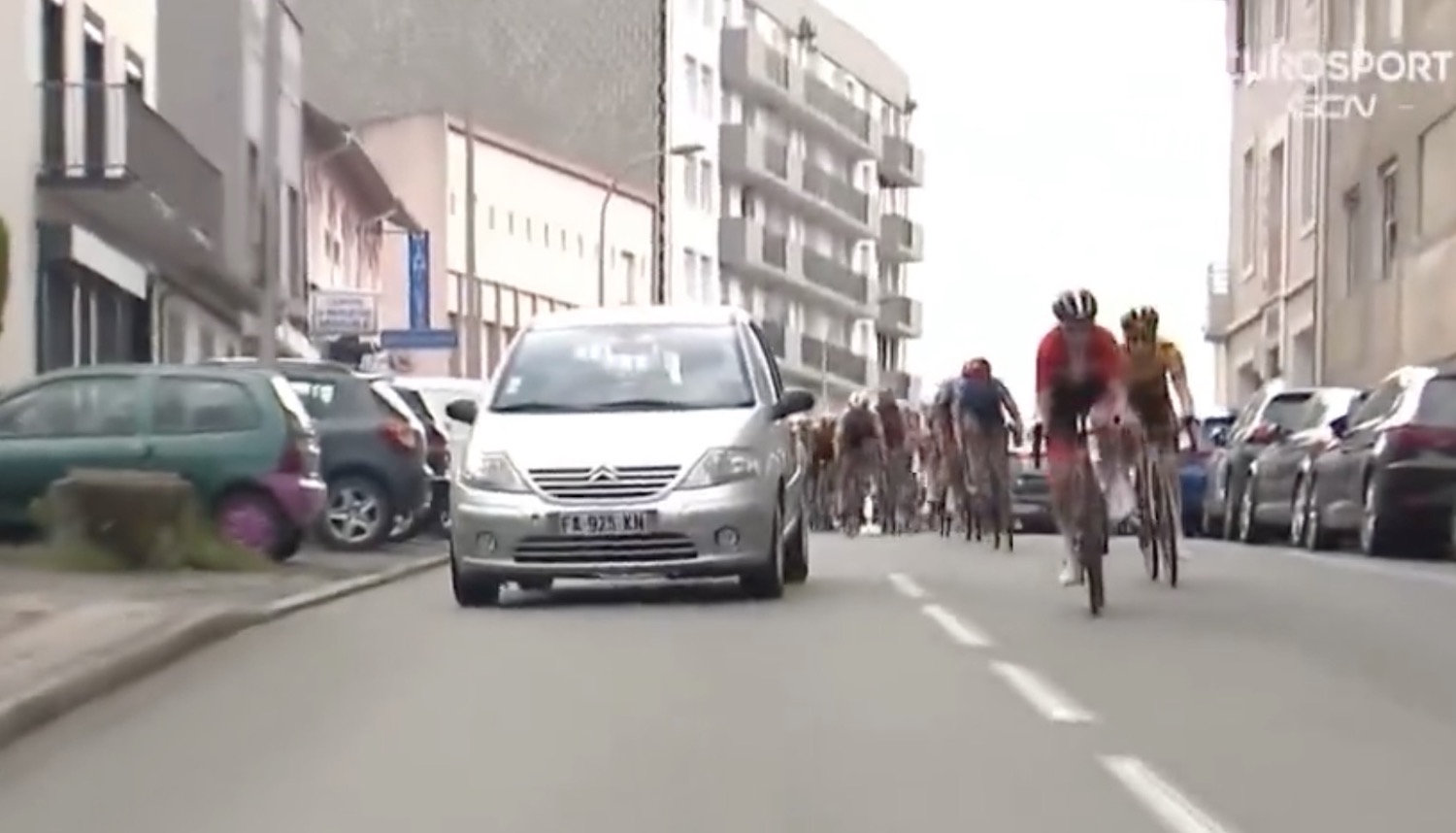Hours before the third and final stage of the CIC-Tour Féminin International des Pyrénées was set to begin on Sunday, the UCI (cycling's governing body) announced the cancellation of the last day of racing after talks between the riders and the organizers of the event. It's a minor miracle that the peloton even got through the first two stages, because organizers failed to keep traffic off the race course. This forced riders to make their way through moving vehicles, parked cars and trucks, and pedestrians who were not kept off the road due to a lack of race marshals.
From the very first stage on Friday, riders were forced to deal with oncoming traffic. It's one thing if a race course has oncoming traffic on a flat zone on one side of the road, as long as there's a barrier between lanes or rigorous effort by marshals to slow down drivers before the peloton approaches the section. But a twisty mountain road with blind turns is the most dangerous place possible to be lax about procedure.
❌ Vehículos con tráfico abierto mientras @yuraniblanco del @LABORALkTeam va escapada
— Esencia Ciclista (@EsenciaCiclista) June 9, 2023
🚗 Coches ocupando gran parte de la calzada al paso por el pelotón en la 1ª etapa Tour des Pyrénées#EsenciaCiclista #TourPyrenees #CICTourFéminin pic.twitter.com/UUNrvhZpEw
Stage 1's finish in Lourdes was even more chaotic, with pedestrians wandering around and a tourist bus just parked in the road. Cecilie Uttrup-Ludwig was nearly taken out by a pedestrian while attacking in the final kilometers. Riders voiced their displeasure with organizers and spent most of the second stage in protest, riding as a bloc and refusing to race each other until the final climb of the day. Teams said that there were fewer cars around during Stage 2, though still a car sped down the road next to the peloton as they ascended Hautacam.
What the actual fuck..?! 🤯🤬 #TourPyrenees pic.twitter.com/MXtfg3DYrp
— Mikkel Condé v2.0 (@mrconde) June 9, 2023
Eventually the group voted to leave. According to Cyclistes Professionnels Associés president Adam Hansen, 17 of the 24 teams determined that the race was too dangerous to continue. Hansen said that when he brought the riders' safety concerns to Tour organizers, they "insisted that stage two was executed like any other normal race and that all my thinking was incorrect," a claim not backed up by any video.
"Considering the safety risks involved, we firmly believe that a bike race is not worth endangering the lives of the female cyclists," Hansen said in the statement. "Therefore, we stand in support of the decision made by the women to discontinue the race, and we believe the race results should remain as they are, including UCI points, ensuring that the women are duly recognised and rewarded for their efforts."
About CIC - Tour Féminin International des Pyrénées. #Cpa #WeAreTheRiders #StrongerTogether #Cycling #WomenCycling #SafetyFirst #CpaWomen pic.twitter.com/awHhqcK5zG
— CPA Women (@women_cpa) June 11, 2023
At men's races of the Tour des Pyrenees's stature—the field at this year's race included several of the best riders in the world—most of the roads are closed well ahead of time. The Tour des Pyrenees used a rolling road-closure method, but it was far more haphazard than it should've been. Closing roads down ahead of the race as it rolls through requires organizers to be proactive, riding far ahead of the pack and securing side streets. There are safe ways to do this, but organizers fell short of their responsibilities, and scoffed at the notion that they bore any fault for the fiasco. Race director Pascal Baudron gave a defiant interview to local outlet La Nouvelle République des Pyrénées, in which he called riders advocating for their own safety a bunch of spoiled girls.
"What is happening is that the girls have demands that are not in line with their level," Baudron said. "They imagine that they are in the Tour de France and that all roads must be closed, that everything must be locked down. But in France, we cannot do that. The day when there will be no more race, they may cry and that is what will happen. Quite honestly, I tell myself that it is not worth organizing a race to see all those months of effort ruined for the whims of spoiled children."
Baudron is full of shit, because smaller races around the world are able to keep their participants safer than he did. The Tour des Pyrenees riders had more sense than whoever allowed them to compete on a Subway Surfers-ass obstacle course.






